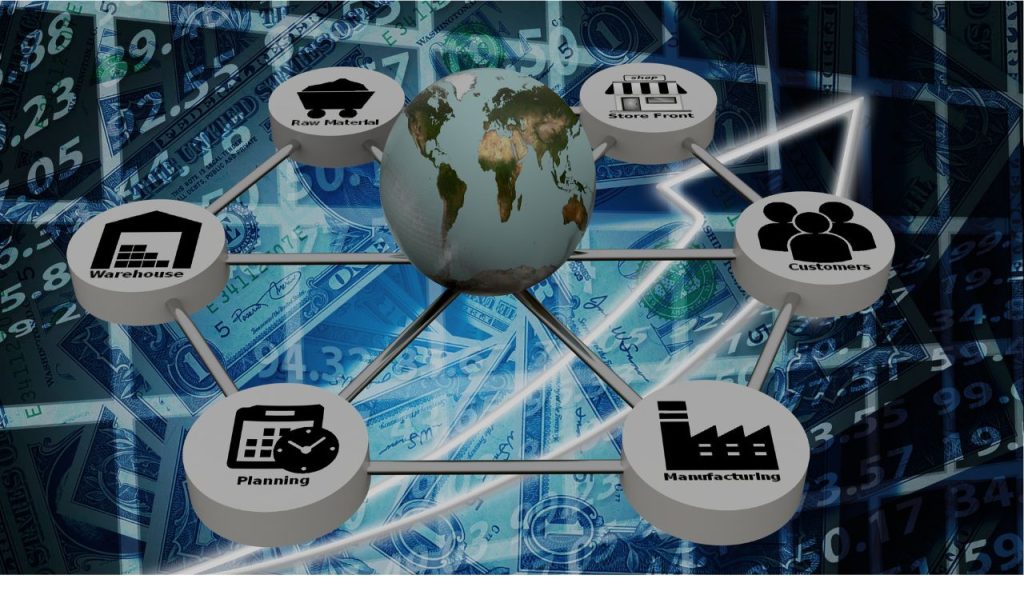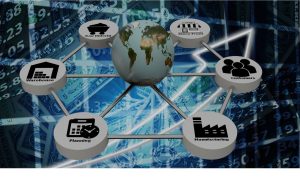Have you ever wondered how that new smartphone in your pocket made its way from concept designs to manufacturing plants to retail stores and finally into your hands? That complex journey happens thanks to supply chain management professionals working behind the scenes.
Let’s break down what makes this field tick, where the opportunities lie, and the challenges you might face along the way. By the end of this article, you’ll have a much clearer picture of whether supply chain management aligns with your professional aspirations and personal strengths.
What are the Pros of a Career in Supply Chain Management?
Innovative and Ever-evolving
Remember the toilet paper shortage during the pandemic? That crisis highlighted how critical effective supply chain management really is. Smart companies responded by completely reimagining their approach to inventory management and distribution networks.
Innovation in this field happens daily, whether through implementing blockchain for traceability or using AI to predict demand fluctuations. This constant evolution means you’ll never get bored or find your skills becoming obsolete. According to recent surveys, over 79% of supply chain professionals report high job satisfaction precisely because of this dynamic environment.
The field rewards creative problem-solvers who enjoy finding new ways to optimize processes. You might start your week figuring out how to reduce shipping costs from China and end it designing a new warehouse layout that improves efficiency by 30%. Each challenge requires fresh thinking and presents opportunities to make meaningful improvements that directly impact the bottom line.
Diverse Opportunities

Few career paths offer the diversity you’ll find in supply chain management. Your options span industries, functional areas, and geographic regions. One day you might be working as an inventory analyst for a luxury fashion brand, and a few years later, you could be heading up procurement for a pharmaceutical giant.
The variety extends to company types as well. From startups needing flexible supply chains to massive corporations with global networks, organizations of all sizes require supply chain expertise. This diversity means you can align your career with personal interests – passionate about sustainability? Focus on green supply chain initiatives. Love technology? Specialize in supply chain analytics and systems integration.
Even better, the skills you develop transfer beautifully across sectors. Learning demand forecasting in consumer goods will serve you equally well if you later move to industrial manufacturing or healthcare logistics. This versatility provides a safety net against industry-specific downturns and allows you to pursue opportunities wherever they emerge.
Pathway to Leadership Roles
Supply chain professionals often enjoy accelerated paths to leadership compared to other disciplines. Why? Because you develop a unique cross-functional understanding of how businesses actually operate. You’ll learn to speak the language of finance, marketing, operations, and product development.
This holistic perspective makes supply chain managers invaluable when companies select candidates for senior roles. The numbers back this up – a surprising number of Fortune 500 CEOs started in supply chain or operations roles. Tim Cook famously leveraged his supply chain expertise as his stepping stone to becoming Apple’s CEO.
The leadership journey typically starts with specializing in one area like procurement or logistics. As you demonstrate success, opportunities emerge to oversee broader segments of the supply chain. Eventually, many professionals advance to director or VP-level positions with responsibility for entire global networks. Each step up the ladder brings increased strategic influence and, of course, compensation to match.
Cross-Functional Interactions
Supply chain roles force you out of the departmental silo that traps so many professionals. You’ll regularly collaborate with teams across the organization – negotiating with finance about inventory investments, coordinating with marketing on promotional forecasts, or partnering with R&D on material specifications for new products.
These interactions develop your communication skills and business acumen in ways that purely technical roles often don’t. You’ll learn to translate complex supply chain concepts for executives while absorbing valuable insights about how other departments operate. This exchange makes you more effective and dramatically increases your visibility within the organization.
The collaborative nature of the work also builds an extensive professional network. You’ll develop relationships with colleagues, suppliers, industry peers, and customers that can open doors throughout your career. Many supply chain professionals credit these connections as critical factors in their career advancement and job satisfaction.
Contribution to Sustainability and Ethics
Today’s consumers increasingly care about where their products come from and how they’re made. This shift has elevated supply chain management from a back-office function to a strategic differentiator centered on sustainability and ethical practices.
Supply chain professionals now lead initiatives that reduce carbon footprints, eliminate waste, ensure fair labor practices, and create circular economy models. These efforts make tangible differences in communities worldwide while building brands that conscious consumers prefer. For professionals seeking purpose alongside paycheck, these responsibilities provide profound satisfaction.
Companies like Patagonia and Unilever have demonstrated that sustainable supply chains drive both customer loyalty and profitability. By championing these initiatives, you position yourself at the intersection of business success and positive global impact – a sweet spot that few career paths offer so directly.
What are the Cons of a Career in Supply Chain Management?
Technological Dependency
While technology empowers supply chain professionals, it also creates vulnerabilities. Systems outages, data breaches, or algorithm errors can instantly derail operations, leaving you to manage the fallout. The pressure to keep everything running smoothly despite these challenges can be intense.
Additionally, the pace of technological change requires continuous learning. Just when you’ve mastered one system, a new platform emerges promising greater efficiency. This constant evolution means you must regularly invest time in updating your technical knowledge, which can feel overwhelming alongside your day-to-day responsibilities.
The reliance on technology also creates a risk of skill obsolescence if you don’t stay current. Professionals who fail to adapt as manual processes become automated may find themselves with diminishing career prospects. Succeeding long-term requires embracing rather than resisting technological advancement – a mindset shift that doesn’t come easily to everyone.
Intense Competition
As the strategic importance of supply chain management has grown, so has competition for the most desirable roles. Entry-level positions often attract hundreds of applicants, while senior positions require increasingly specialized expertise and proven track records of measurable results.
Education requirements have similarly escalated. Many companies now prefer candidates with specialized degrees in supply chain management rather than general business backgrounds. Professional certifications like CSCP (Certified Supply Chain Professional) or CPIM (Certified in Production and Inventory Management) have become essential credentials for career advancement.
Global competition adds another dimension, as companies increasingly source talent internationally. Professionals in high-cost markets sometimes compete with equally qualified candidates from regions with lower salary expectations. Staying competitive requires continuous skill development and the ability to demonstrate clear value beyond basic technical competencies.
Ethical Dilemmas
Supply chain roles regularly present ethical challenges that can create personal and professional stress. You might discover suppliers using questionable labor practices or face pressure to cut environmental corners to meet cost targets. These situations force difficult choices between business objectives and personal values.
The global nature of supply chains compounds these issues, as standards and regulations vary widely between countries. What’s acceptable or even legal in one region may violate policies or principles important to you or your organization. Navigating these differences requires diplomatic skill and ethical clarity.
Additionally, supply chain decisions can have far-reaching consequences for communities and ecosystems. A choice to source from one region versus another impacts livelihoods and local economies. Responsibility for these outcomes weighs heavily on conscientious professionals who understand the ripple effects of their decisions across global networks.
Long Working Hours
Supply chain operations never sleep in our interconnected global economy. This reality often translates to extended hours, weekend work, and middle-of-the-night crisis management when disruptions occur. The pressure to maintain service levels despite unforeseen challenges can seriously strain work-life balance.
International roles amplify these demands, as you coordinate across multiple time zones. Early morning calls with Asian suppliers might be followed by evening discussions with European transportation partners. This schedule compression leaves limited time for personal pursuits and can lead to burnout if not managed carefully.
The seasonal intensity of many supply chains adds another challenging dimension. Retail supply chain professionals, for instance, often sacrifice holidays and personal time during peak seasons. While compensation typically reflects these demands, the lifestyle impact deserves serious consideration before pursuing certain supply chain specialties.
Complex Problem Solving

You’ll frequently encounter problems involving dozens of variables, multiple stakeholders with competing priorities, and significant financial implications. Finding optimal solutions requires advanced analytical skills and comfort with ambiguity.
These complex decisions often must be made with incomplete information and under significant time pressure. A port strike might force immediate rerouting of shipments, or a quality issue could require reconfiguring an entire production schedule. The consequences of poor decisions can cascade throughout the organization.
The complexity extends to measurement as well. Supply chain performance involves balancing conflicting metrics like inventory levels, service rates, and cost efficiency. Improving one dimension often means compromising another, creating constant tension in decision-making. This balancing act requires sophisticated judgment developed through experience and sometimes painful lessons.
ALSO READ: How to Become a Software Developer
FAQs
While entry-level positions may accept candidates with bachelor’s degrees in business or related fields, specialized supply chain degrees increasingly provide competitive advantage. For leadership roles, many professionals pursue graduate degrees or industry certifications from organizations like ASCM or ISM.
Entry-level analysts typically earn $50,000-$70,000, while mid-career managers can expect $80,000-$120,000. Senior directors and executives often command salaries exceeding $150,000, with additional performance bonuses. Compensation varies significantly by industry, location, and specialization.
Yes, supply chain management offers remarkable stability. Even during economic downturns, companies need efficient supply chains to control costs and maintain competitiveness. The essential nature of these functions provides job security rarely found in other business disciplines.
Technology is automating routine tasks while creating demand for analytics, system integration, and digital transformation skills. Successful professionals now blend traditional supply chain knowledge with digital fluency. This evolution favors those willing to continuously update their technical capabilities alongside core domain expertise.




